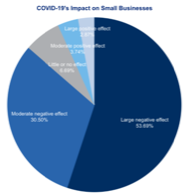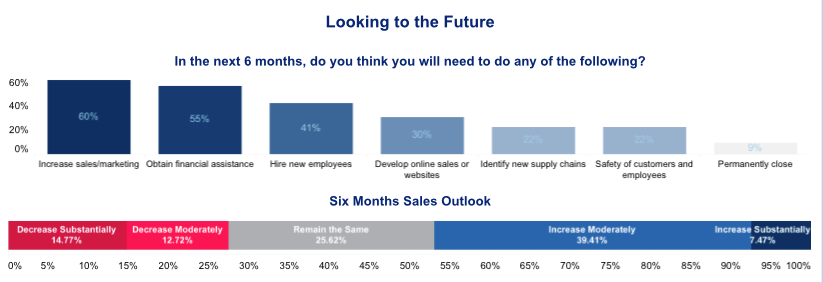The Florida Small Business Development Center (SBDC) Network, the Florida Chamber Foundation, CareerSource Florida, and the University of West Florida Haas Center today released new data from the second phase of a research study to understand the impacts of COVID-19 on the state’s small businesses as the pandemic and subsequent economic impacts surpassed the one-year mark.
The Small Business COVID Impact Survey 2.0 garnered more than 1,100 responses. The survey served as a follow-up to a survey conducted last year to assess the impact of the coronavirus on the state’s small businesses. In last year’s study, 86 percent of respondents reported a loss in revenue and 40 percent reported closing their doors permanently due to the pandemic.
“The pandemic permeated every facet of our daily lives, and the social and economic implications from COVID will be experienced for years to come,” said Greg Britton, CEO of the Florida SBDC Network. “Small businesses are the backbone of our state’s economy, and this study serves as an important opportunity to help our organizations better understand their continued needs and future outlook to better support their recovery.”
Respondents reported that COVID has left serious negative effects across their businesses, however, overall most reported improving metrics and a more optimistic outlook.

Many small businesses indicated they would need to increase sales and marketing, obtain financial assistance, and hire new employees over the next six months. Forty-six percent of respondents were moderately or extremely concerned about acquiring capital and, of those who applied for capital, 40 percent indicated accessing relief capital was harder than anticipated.
“Understanding the continued impacts on small businesses will help policymakers strategize recovery measures vital to encouraging job creation and growth,” said Dr. Jerry Parrish, Chief Economist and Director of Research for the Florida Chamber Foundation.

The second phase of the survey also inquired about the utilization of independent gig workers and businesses’ share of online sales.
The majority of businesses indicated that independent workers could only support
10 percent or less of their business activities. Respondents indicated training and quality assurance, and lack of oversight as the top concerns in leveraging independent workers.
“Gaining a deeper understanding of the long-term employment impacts of the COVID-19 pandemic will help the CareerSource Florida network anticipate both ongoing and evolving needs of job seekers and employers, and enhance our ability to connect them with valuable resources,” said Michelle Dennard, president, and CEO of CareerSource Florida. “CareerSource Florida is grateful to the Florida SBDC Network for ensuring education, economic development, and workforce development partners have timely data to inform policy and ensure the right tools are available to support small businesses.”
Nearly a third of respondents represented businesses in operation for five years or less. While varied across industries, the largest groups of respondents were among professional, science, and technology fields; as well as retail, accommodation, and food services.
“Our mission is to support the state through market research and data analysis,” said Nicole Gislason, Executive Director of the University of West Florida Haas Center. “This survey represents an important opportunity to depict the current state of small businesses and ensure their voices do not fade.”
To learn more, and to view the survey findings, please visit https://floridasbdc.org/disaster/covid-impact-survey/phase-2-results/.

